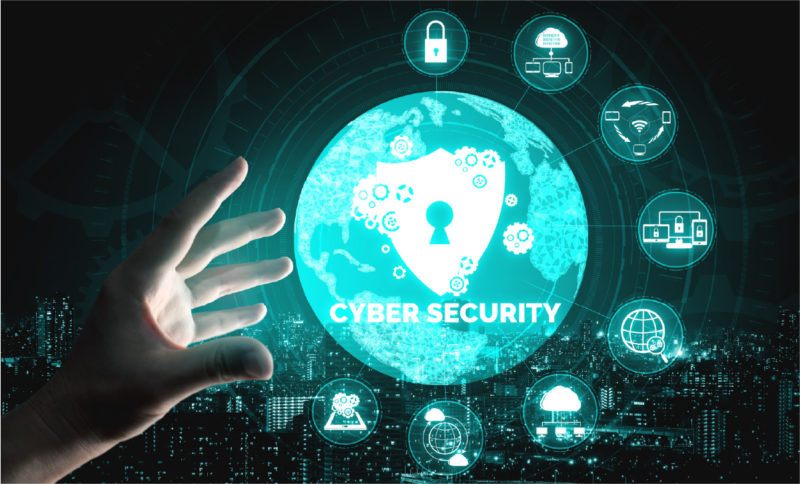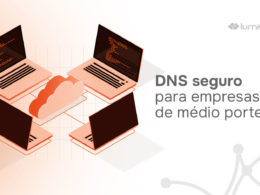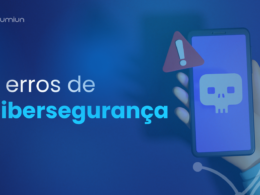We know that the data is the main piece of your company and that keeping it safe is the basis of success. You look for a cybersecurity solution to protect data, but don't know where to start. Finding something that perfectly fits your cyber security needs can be confused.
You are probably feeling lost by the number of safety options that exist in 2021. Anxiety takes over because you need to find the most effective cyber security for your business. But what are the care and main features you should observe in a cybersecurity solution for a small or medium company?
In this article, you will know the main mistakes to avoid and tips to help the decision and find a better cyber solution for small or medium business.
5 errors that should be avoided when choosing the cybersecurity solution
Choosing a cybersecurity solution can be difficult but not impossible as long as you know your own needs and keep an eye on possible traps. To help you, here are some common mistakes to be avoided during your research.
1. Not knowing your own risks
If the news of a data violation or a cyber attack gives you a shiver on your spine, you should already understand a little of your own risks.
Cyber attacks can cause data loss, reputation and, of course, money. According to the 2020 data breach cost report , sponsored by IBM Security and conducted by the Ponemon Institute, data violation costs an average of R $ 5.88 million for companies in Brazil .
Solution sellers know how scary data loss can be and also know that some of their potential customers are concerned about violations, but they are also lay on the subject and do not know their own risks. Uncapped sellers take advantage of these concerns by offering your product as a solution, even if it does not protect against the company's specific risks, making the buyer spend time and money on a solution that cannot protect his assets.
When you are buying a cyber security solution, it is important to know what your risks are. Do your computers break due to viruses? Is there no traffic control between the internal network and the internet? Are employees clicking links that should not?
If you are aware of the risks, sellers (unethical) cannot push your product as a solution to the problems your business does not have.
2. Receive only insights
Due to the limited budgets of SMEs, it is essential that the solution acquired not only identifies problems, but provides tools to correct vulnerabilities. Small and medium -sized companies need action, not just insights, solutions so that security professionals can be effective in blocking the risk.
3. Think you can do everything internally
Why spend money on a cyber security solution when you have an internal team, right? If you are a coordinator or IT professional, you may have heard this from your colleagues. Some even think that security should be the function and obligation of the IT department.
Although good information security practices are everyone's responsibility, cyber security for an entire company is a great job, and your internal team may need tools to manage it. In fact, many companies are looking for foreign aid when it comes to safety.
Do not be ashamed to get outside help. Remember that a single violation can cost more than the cost of outsourcing part of your cyber security operation.
3. Do not make a demonstration
It is always useful to try before you buy, especially when you are dealing with something as important as information security. You will want to test the product internally to make sure it does what you should do and to understand if it is the right product for your business needs.
If you fail to demonstrate, try at least 30 days guaranteed satisfaction, with full return of investment, if the product does not meet your needs and expectations in the first month.
4. Do not take into account the legislation
Probably your business must obey specific information security laws. Government, Finance, Health - All sectors have their own regulations, standards and practices recommended when it comes to information security. You can also be required to meet specific standards, such as LGPD, based on your location or location of your customers.
Do not forget these regulations when it comes time to choose a cybersecurity solution. Not all solutions are designed to function with all sets of regulations. You must choose a solution that makes it easier to comply with the laws , and no longer difficult.
5. Not knowing the opinion of other customers
You read the reviews before you go to a restaurant or buy an online product. There is no reason why you should not do the same check before choosing a cybersecurity solution.
Instead of simply accepting the seller's word, look for some customers and ask them about your experience. You may want to locate customers specifically in your industry and ask how the provider helped them with compliance. You can also find customers who left and ask why.
If you do not find customers on the solution website, ask the consultant to introduce you to 5 other clients in the same sector of yours so you can do a quick search. For example, if you are an accounting office in São Paulo, ask which other offices in the region already use the services and send an email or make a quick connection to know their opinion.
No matter which questions you ask, this type of research will say things about the solution you will not get from the supplier itself.
5 tips to help your decision to get the best cybersecurity solution
A common misconception about cybersecurity is that simply taking the "latest and better" safety solutions from the best known cyber security companies is an infallible way to protect a company against online threats.
Although the best cyber security solutions can help, you are often using a war cannon to bombard an anthill. That is, there may be another cheaper solution that can fit perfectly to your company's safety needs.
The question is: How can you be sure you are choosing the best data security solution for your business?
Well, like many important business decisions, there is a process you can use to optimize your decision to get the best protection without affecting your everyday operations:
1. Evaluate its risks and cyber security vulnerabilities
Remember the first mistake to be avoided? Well, it's also our first tip.
Before you leave to choose a cybersecurity solution, make sure you carefully evaluate what you need to protect, what your risks are if your protection fails, and how invaders probably violate your current cyber security measures.
This usually means using three different cyber security assessments:
- Asset Audit . An asset audit examines all the various components of your network to determine what your network's end points are, which data and software programs are at these end points and how your overall network is. This is the first step in determining what your cyber safety risks and vulnerabilities are, as it provides a complete view of what is on your network.
- Risk assessment . Here, you evaluate what is on your network to determine what risks you face - such as what would happen if your primary data center were turned off or if someone got direct access to your database illicitly. Establishing your greatest risks of cyber security and what your impacts would be vital to prioritize your cyber security efforts.
- Vulnerability evaluation . After determining what your most significant risk factors are, it is important to evaluate how well protected your network is against various types of cyber threats. Here, you will check things like outdated security patches in the software, will evaluate the level of cyber security awareness in your company and even perform security tests that can expose previously detected weaknesses.
After running all these evaluations and organizing discoveries in a comprehensive report, you must have a solid understanding of what is on your network, which needs more protection and how vulnerable your network is to attacks. This will help you in your search for data security solutions, allowing you to know what types of protection you need.
2. Consider your plans for future growth
Scalability is a major concern when choosing cybersecurity solutions. A scalable solution can grow along with your business without significantly impacting your resources, while a non -scalable tool can begin to lose effectiveness or impact your business performance as you expand your operations.
Therefore, when choosing a cybersecurity solution, consider your plans for the growth of your business. Where do you plan to be in a year? How about five years? Consider your long and short -term growth goals and how it can impact your cyber security needs before choosing any corporate safety solution.
3. Consider your current security tools
Before adding a new security solution to your business network, consider how this solution will integrate with your existing data security measures.
Is there already a data security tool that performs a task for which the new was designed? If so, the new security solution improves the old tool in any way? If you already have a tool that does the same thing and the new solution does not improve in any way, you should reconsider time and money to integrate a new tool.
However, if support for the old security solution is being discontinued, replacing it with another tool that makes the same thing.
4. Consider the “ease of use” of the new tool
Adding a new data security solution will probably have a significant impact on your existing security procedures - which can improve or decrease the ease of use of your network.
The problem of negatively impacting your business user experience (UX) is that it can make tasks slow for employees users. Worse yet, if you have customer-oriented apps running on your network, a bad UX can push them away. It is therefore important to consider how the new data security solution will affect your current security procedures. Some questions to ask include:
- Does the new solution add or remove steps from my current security processes?
- What new information, if any, will employees / clients with user accounts have to memorize?
- How will the new security solution affect network performance (will cause slowness or other problems that make / make the login and use of assets a long time in the network a long time)?
- How can employees try to circumvent the new security solution?
- Which training may need to be implemented to familiarize employees with the new solution?
Ideally, you want to make sure your new cybersecurity solution does not affect your current security processes and do not overload your network. However, there may be times when you need to balance your safety need for the need for ease of use.
5. Consider humanized and affordable support
You may have already had a bad experience in buying a product or service, where until the time of purchase you had a first service and soon after it fell out of oblivion without a support to help handle or configure the product. This makes you unable to enjoy all the features and have a frustrating experience.
Support, onboarding, or quality after sales is essential for the success of using a cybersecurity solution. It is not enough to have just a help page with extensive texts or a bot that just makes you angry. It needs to be human and have the channels available to serve it as soon as possible. After all, security is not a secondary issue that can be set aside.
See some important points about support to take into account:
- 5 × 8 or 7 × 24 phone support center
- Chat or WhatsApp service
- Aid Center with Documentation and Tutorials
- Help Desk to follow calls via email
Additional considerations when selecting the cybersecurity solution
- Do they understand the business they are protecting, that is, they understand your business?
- Can they speak of lay in the technical language in the technical terms?
- Do they provide analogies to help non -technical buyers and end users understand technical concepts?
- Are they updated with latest technologies, trends and problems such as attacks and threats?
- Are they experts on the subject and proficient in solutions, services and processes?
- Are they highly collaborative to achieve their goals and business goals?
- Are they continuous students with updated skills?
- Do they solve problems carefully to the details?
- Can they be your trustworthy partner?
What should I do now?
Now that you know 5 mistakes to avoid and 5 tips to be observed when choosing a cyber security company, you are ready to take the next step: find the most suitable for your business and budget.
At Lumiun, we are in love with helping our customers and anyone who has questions about cyber security in small and medium enterprises. Our team is ready to understand your needs and explain how our solution can or may not help.
We are committed to providing our customers for a 24 -hour incident response, 7 days a week, with proprietary threat intelligence that helps us make informed decisions. Our cyber security experts are at the top of your game and will be at your disposal if you knock on our door. And if you do that, our security expert team will be eager to answer your questions at any time to provide the professional vision and transparency you deserve.
If you want to know more about how we can protect your data from cyber threats, talk to our consultant . Or, if you prefer, request a free test to see in practice how our solution works and meets your expectations and needs.











1 comment
Comments closed